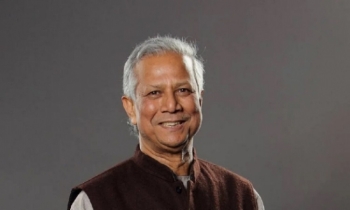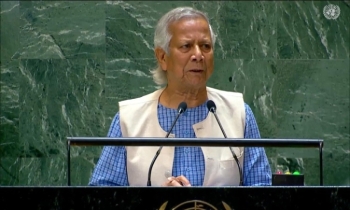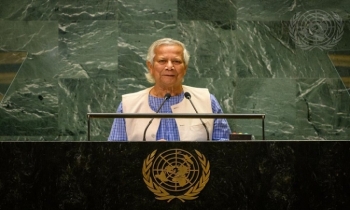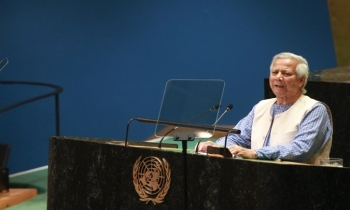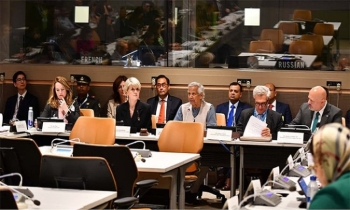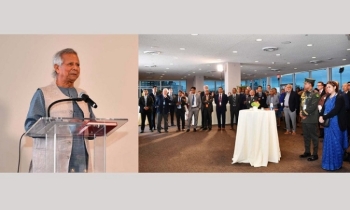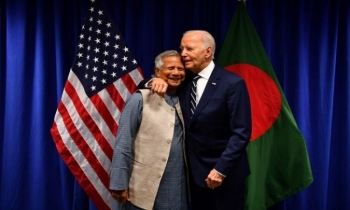Bangladesh doesn’t want conflict: PM
BI Desk || BusinessInsider
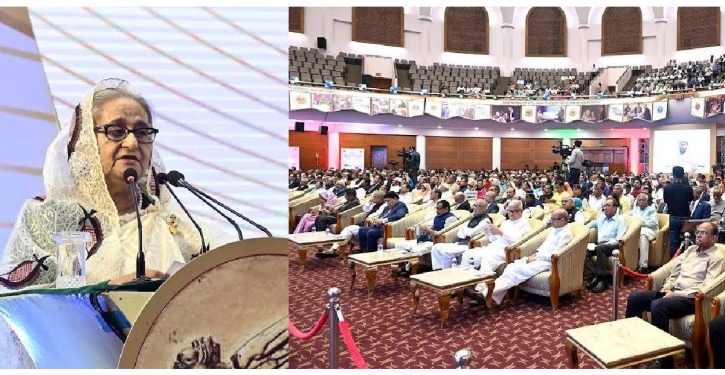
Photo: Collected
Prime Minister Sheikh Hasina on Sunday said Bangladesh doesn’t want any more conflict rather it wants to improve the quality of people’s lives.
“We don’t want any more unrest and conflict. We want to improve the quality of people’s lives. And we always wish it,” she said.
In this regard, Sheikh Hasina referred to the peaceful democratic environment that prevailing in the country from 2008 election helped Bangladesh to attain the remarkable socioeconomic development in the last 14 years.
“Bangladesh has been able to attain socioeconomic development due to the peaceful democratic environment prevailing in the country since 2008 election as Awami League won the elections and formed the government in 2009,” she said.
The premier made this remarks while addressing a function organised to celebrate the golden jubilee of the conferment of the Joliot-Curie Peace Medal to Father of the Nation Bangabandhu Sheikh Mujibur Rahman, reports Bangladesh Sangbad Sangstha.
She said the government, after being elected in 2008 election, has been working for the development of the people of the country in a planned way.
“As a result, we have been able to reduce the poverty rate and maternal death, increase literacy rate and life expectancy,” she said.
She continued that the sustainable and peaceful democratic environment, prevailing in the country, is the only reason behind the unprecedented socioeconomic progress of Bangladesh.
“So, a peaceful sustainable environment is helpful for the people to attain economic emancipation, and all have to remember it,” she added.
The Prime Minister laid emphasis on settle-down all disputes through dialogue that Bangladesh did with India and Myanmar.
“Why this arms competition (going on) now, why the money that is using for arms competition will not be used for hungry children and human. For this arms competition thousands of children and women are leading inhuman lives around the globe,” she noted.
In this connection, Sheikh Hasina mentioned that Bangladesh has given shelter to more than one million forcibly displaced Myanmar nationals, Rohingya, who faced oppression that recalled her the situation of 1971.
“We want that peace shall return in the earth, there shall be no types of unrest (in the earth),” she said.
The Prime Minister said that those who didn’t want the Independence of the country killed Father of the Nation Bangabandhu Sheikh Mujibur Rahman. “Every moment, we have to overcome their (anti-Liberation forces) barriers,” she added.
Expressing her tribute to Father of the Nation Bangabandhu Sheikh Mujibur Rahman, the Premier said that Bangabandhu had received peace prize, disseminated the message of peace in his entire life, but he had to sacrifice his life.
“What a misfortune for us, the man who spoke of peace had to give his life,” she said, adding that “today, he is no more with us, but we want that his country may build up as a developed and prosperous one.”
Sheikh Hasina also announced to introduce “Bangabandhu Sheikh Mujib Peace Prize” to recognise those who are working for establishing peace in home and abroad.
“Because we want peace and we will surely advance towards the path of peace,” she said.
Cabinet Division organised the event at Bangabandhu International Conference Center (BICC).
Cabinet Secretary Md Mahbub Hossain delivered welcome address, while eminent politician and researcher Monayem Sarker made keynote speech at the programme.
Former Vice Chancellor of Dhaka University Professor Dr AAMS Arefin Siddique, former Principal Secretary Kamal Abdul Naser Chowdhury and Noted Writer Anwara Syed Haq took part at the discussion on keynote speech.
President of Bangladesh Peace Council Mozaffar Hossain Paltu delivered vote of thanks.
On the outset, a video documentary on Bangabandhu and his Joliot-Curie Peace Medal receiving was screened.
At the function, the Premier unveiled commemorative postage stamp and first day cover on the occasion of the golden jubilee of the conferment of the Joliot-Curie Peace Medal to Father of the Nation Bangabandhu Sheikh Mujibur Rahman. She also unveiled the cover of a souvenir publication to mark the day.
Bangabandhu Sheikh Mujibur Rahman was awarded the Julio-Curie Peace Prize by the World Peace Council on May 23, 1973.
World leaders like Fidel Castro, Ho Chi Minh, Yasser Arafat, Salvador Allende, Nelson Mandela, Indira Gandhi, Mother Teresa, poet and politician Pablo Neruda, Jawaharlal Nehru, Martin Luther King and Leonid Brezhnev were awarded the prize.
The peace prize of the World Peace Council was an international recognition of Father of the Nation Bangabandhu Sheikh Mujibur Rahman for his contribution to the establishment of world peace.
The Julio-Curio Peace Prize award was the first ever international award for Bangladesh.
As a result of this great achievement, the Father of the Nation became Bhishwabandhu from Bangabandhu.
To commemorate the contributions of world-renowned scientists Marie Curie and Pierre Curie to the struggle for world peace, the World Peace Council has been awarding Julio Curie Peace Prize to distinguished individuals and organisations since 1950 for outstanding contribution to the fight against fascism, anti-imperialism, humanitarian welfare and peace.
Referring to Bangabandhu’s quote where he had said that people are the power, people are the source of power, the Prime Minister said “I believe in that belief and my walk with that faith.”
Today, Bangladesh is playing an unprecedented role in maintaining peace around the world, she said, adding that “As the number one country in UN peacekeeping missions, we are keeping peace around the world.”
Sheikh Hasina said “People of Bangladesh, we always believe in peace. We want to develop the country economically.”
She said that the poverty rate in Bangladesh was 41 percent, but today the government has been able to bring it down to 18.7 percent, while number of poor was 25.9 percent which has been come down to 5.6 percent.
“InshAllah, no people will be poor, homeless or landless in this country. Every human being will get at least their basic rights, food, clothing, education, medical care, shelter. We are working towards that goal,” she added.
The premier attributed the continuous peaceful environment behind this today’s socio-economic development of Bangladesh.
After the assassination of Father of the Nation in 1975, Sheikh Hasina said that the atmosphere in the country was chaotic and there was curfew at every night.
“After 21 years, we came to power in 1996 and were able to make some improvements. At least we can say this that we made the foundation,” she said, adding that “In the middle, there was a turbulent environment (2001 to 2008)”.


